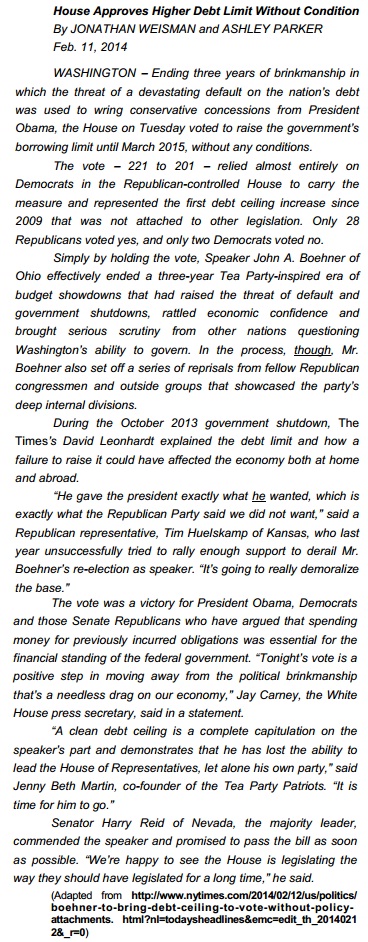Questões de Concurso Público AL-PE 2014 para Analista Legislativo - Direito Constitucional, Administrativo e Eleitoral
Foram encontradas 5 questões
Considere a seguinte definição:
Brinkmanship is the technique of pushing a dangerous situation to the limits of safety in order to secure the greatest advantage.
Em qual dos exemplos abaixo a palavra brinkmanship está empregada de forma incorreta?
Segundo o texto,
De acordo com o texto,
By JONATHAN WEISMAN and ASHLEY PARKER
Feb. 11, 2014
WASHINGTON - Ending three years of brinkmanship in which the threat of a devastating default on the nation’s debt was used to wring conservative concessions from President Obama, the House on Tuesday voted to raise the government’s borrowing limit until March 2015, without any conditions.
The vote - 221 to 201 - relied almost entirely on Democrats in the Republican-controlled House to carry the measure and represented the first debt ceiling increase since 2009 that was not attached to other legislation. Only 28 Republicans voted yes, and only two Democrats voted no.
Simply by holding the vote, Speaker John A. Boehner of Ohio effectively ended a three-year Tea Party-inspired era of budget showdowns that had raised the threat of default and government shutdowns, rattled economic confidence and brought serious scrutiny from other nations questioning Washington’s ability to govern. In the process, though, Mr. Boehner also set off a series of reprisals from fellow Republican congressmen and outside groups that showcased the party’s deep internal divisions.
During the October 2013 government shutdown, The Times’s David Leonhardt explained the debt limit and how a failure to raise it could have affected the economy both at home and abroad.
“He gave the president exactly what he wanted, which is exactly what the Republican Party said we did not want,” said a Republican representative, Tim Huelskamp of Kansas, who last year unsuccessfully tried to rally enough support to derail Mr. Boehner’s re-election as speaker. “It’s going to really demoralize the base.”
The vote was a victory for President Obama, Democrats and those Senate Republicans who have argued that spending money for previously incurred obligations was essential for the financial standing of the federal government. “Tonight’s vote is a positive step in moving away from the political brinkmanship that’s a needless drag on our economy,” Jay Carney, the White House press secretary, said in a statement.
“A clean debt ceiling is a complete capitulation on the speaker’s part and demonstrates that he has lost the ability to lead the House of Representatives, let alone his own party,” said Jenny Beth Martin, co-founder of the Tea Party Patriots. “It is time for him to go.”
Senator Harry Reid of Nevada, the majority leader, commended the speaker and promised to pass the bill as soon as possible. “We’re happy to see the House is legislating the way they should have legislated for a long time,” he said.
(Adapted from http://www.nytimes.com/2014/02/12/us/politics/ boehner-to-bring-debt-
ceiling-to-vote-without-policy- attachments. html?nl=todaysheadlines&emc=edit_th_2014021 2&_r=0)
By JONATHAN WEISMAN and ASHLEY PARKER
Feb. 11, 2014
WASHINGTON - Ending three years of brinkmanship in which the threat of a devastating default on the nation’s debt was used to wring conservative concessions from President Obama, the House on Tuesday voted to raise the government’s borrowing limit until March 2015, without any conditions.
The vote - 221 to 201 - relied almost entirely on Democrats in the Republican-controlled House to carry the measure and represented the first debt ceiling increase since 2009 that was not attached to other legislation. Only 28 Republicans voted yes, and only two Democrats voted no.
Simply by holding the vote, Speaker John A. Boehner of Ohio effectively ended a three-year Tea Party-inspired era of budget showdowns that had raised the threat of default and government shutdowns, rattled economic confidence and brought serious scrutiny from other nations questioning Washington’s ability to govern. In the process, though, Mr. Boehner also set off a series of reprisals from fellow Republican congressmen and outside groups that showcased the party’s deep internal divisions.
During the October 2013 government shutdown, The Times’s David Leonhardt explained the debt limit and how a failure to raise it could have affected the economy both at home and abroad.
“He gave the president exactly what he wanted, which is exactly what the Republican Party said we did not want,” said a Republican representative, Tim Huelskamp of Kansas, who last year unsuccessfully tried to rally enough support to derail Mr. Boehner’s re-election as speaker. “It’s going to really demoralize the base.”
The vote was a victory for President Obama, Democrats and those Senate Republicans who have argued that spending money for previously incurred obligations was essential for the financial standing of the federal government. “Tonight’s vote is a positive step in moving away from the political brinkmanship that’s a needless drag on our economy,” Jay Carney, the White House press secretary, said in a statement.
“A clean debt ceiling is a complete capitulation on the speaker’s part and demonstrates that he has lost the ability to lead the House of Representatives, let alone his own party,” said Jenny Beth Martin, co-founder of the Tea Party Patriots. “It is time for him to go.”
Senator Harry Reid of Nevada, the majority leader, commended the speaker and promised to pass the bill as soon as possible. “We’re happy to see the House is legislating the way they should have legislated for a long time,” he said.
(Adapted from http://www.nytimes.com/2014/02/12/us/politics/ boehner-to-bring-debt-
ceiling-to-vote-without-policy- attachments. html?nl=todaysheadlines&emc=edit_th_2014021 2&_r=0)
